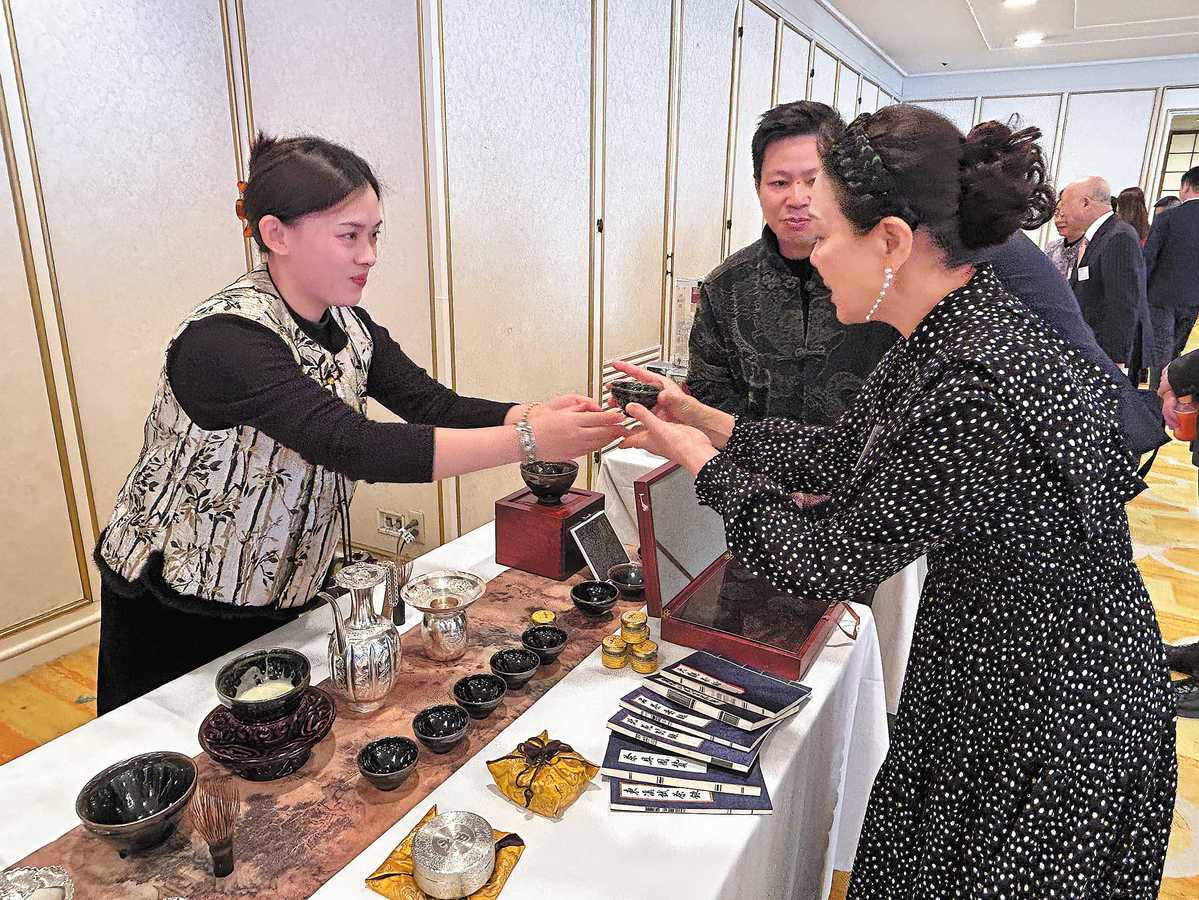
An attendee receives a cup of Beiyuan Tribute Tea, a specialty from China's Fujian province, in the meeting's exhibition area in Tokyo on Tuesday. JIANG XUEQING/CHINA DAILY
Fostering cultural and people-to-people exchanges between China and Japan requires deeper collaboration between media organizations and think tanks from both countries, participants of a dialogue said in Tokyo on Tuesday.
They also underscored the importance of promoting peaceful coexistence, fostering generational friendship, and deepening mutually beneficial cooperation.
Jointly hosted by Xinhua News Agency and the Chinese embassy, the event brought together about 160 representatives from media organizations, think tanks and other friendly circles from both nations.
Fu Hua, president of Xinhua News Agency, said media and think tanks in China and Japan should take the lead in fostering bilateral friendship.
To advance bilateral relations, they must stay attuned to the times, build on past achievements, fulfill their responsibilities, and push for new progress and outcomes in cultural exchanges, he said.
He also underscored their role in effectively reporting on the two nations' efforts to uphold peace and promote peaceful development.
In addition, Fu urged media and think tanks to share compelling stories of people-to-people exchanges, helping forge closer connections between citizens and reinforcing the grassroots foundation of China-Japan friendship.
Chinese Ambassador to Japan Wu Jianghao said bilateral relations are at a critical stage of improvement and development. While positive interactions are increasing across various levels and fields, he acknowledged that significant contradictions and differences remain and must be properly managed.
"The most important task for both sides is to swiftly implement the key consensus reached by the leaders of China and Japan, maintain strategic focus, stay on the right course, uphold the political foundation of bilateral relations, prevent external disruptions, and work toward building China-Japan relations that meet the demands of the new era," Wu said.
In December, the two countries held the second meeting of a high-level consultation mechanism on cultural and people-to-people exchanges in Beijing. They reached a broad consensus on deepening cooperation in fields such as media, think tanks and youth exchanges while outlining plans to advance cultural exchanges.
Takeshi Noda, president of the Japan-China Society, said that as close neighbors, China and Japan naturally experience both periods of harmony and moments of disagreement.
Win-win dynamic
Emphasizing the need for a win-win dynamic, Noda underscored the importance of open dialogue in allowing people from both nations to share perspectives, overcome misunderstandings, and work together toward a deeper mutual understanding.
"The world is changing rapidly, and political landscapes, including in the United States, are evolving in ways we have never seen before," he said. "In such times of transformation, it is even more crucial for China and Japan to engage in meaningful dialogue. Differences in opinion are inevitable, but rather than avoiding them, we should engage in open discussions and constructive exchanges to find common ground."
Takashi Sasaki, chairman of TBS Holdings, stressed the importance of seizing the current opportunity to strengthen China-Japan exchanges.
"The timing is crucial — we must not let this chance slip away. Now is the moment to revitalize our exchanges," Sasaki said.
He stressed the significance of people-to-people ties. While political and economic news is essential, grassroots exchanges also play a vital role in fostering mutual understanding and warming hearts, he added.
jiangxueqing@chinadaily.com.cn